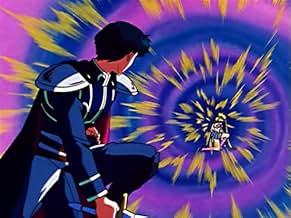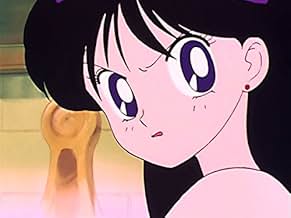Usagi is a clumsy but kindhearted girl who transforms into the powerful guardian of love and justice, Sailor Moon. Meeting allies along the way, Usagi and her team of Sailor Guardians fight ... Read allUsagi is a clumsy but kindhearted girl who transforms into the powerful guardian of love and justice, Sailor Moon. Meeting allies along the way, Usagi and her team of Sailor Guardians fight to protect the universe from forces of evil.Usagi is a clumsy but kindhearted girl who transforms into the powerful guardian of love and justice, Sailor Moon. Meeting allies along the way, Usagi and her team of Sailor Guardians fight to protect the universe from forces of evil.
- Awards
- 2 nominations total
Storyline
Did you know
- TriviaThe Sailor Senshi's civilian names relate to their superhuman roles:
- the name of Usagi Tsukino is loosely translated as "Rabbit of the Moon" ("usagi" means "rabbit", and "tsuki" means "moon").This pertains to a Japanese folktale about a rabbit that can be seen in the Moon, and also to her moon-based powers.
- Chibiusa is a loose term of "little Usagi" ("chibi" means "little" or "mini"), she being Usagi's daughter and Sailor Chibi Moon (Sailor Mini Moon in the original English dub from Cloverway).
- Ami Mizuno reads "Asian Beauty of Water" ("A" means "Asian" and "mi" means "beauty", while "mizu" means "water"), which reveals her power to control water.
- Rei Hino's surname relates to fire ("hi" means "fire"), which reveals her power to control fire. The word "rei" could be translated as "beautiful", "companion", "spirit", or "soul" (the latter fits her "Fire Soul" cry), but the name "Rei" is always written in Katakana, which suggests that it doesn't have any Japanese meaning.
- Makoto Kino translates as "Tree Spirit Makoto" ( "ki" means "tree" and "spirit"), and her power is control over nature (mostly trees/lightning).
- Minako Aino reads "Beautiful Child of Love" ("mi" means "beauty" and "ko" means child, while "ai" means "love"). This pertains to Venus being the goddess of love.
- Setsuna Meioh is loosely translated as "Moment of Pluto", which alludes to her power over time ("setsuna" means "moment", while "mei" and "o" mean "dark" and "king" and are derived from "meiosei"-"Dark King Star" which describes Pluto).
- Michiru Kaioh means "Neptune Rising" ("michiru" means "rising", while "kai" and "o" mean "sea" and "king" and are derived from "kaiosei"-"Sea King Star" which describes Neptune), which alludes to her powers coming from the ocean.
- Haruka Tenoh means "Distant Uranus" ("haruka" means "distant", while "ten" and "o" mean "sky" and "king" and are derived from "tenosei"-"Sky King Star" which describes Uranus) which alludes to her powers coming from the sky/wind.
- Hotaru Tomoe is loosely translated as "Firefly of Saturn" ("hotaru" means "firefly", while "to" means "earth" and is derived from "dosei"-"Earth Star" which describes Saturn). Fireflies are associated with spirits of the dead, which allude to her power of death/rebirth.
- GoofsIn the Hebrew dub the Senshi said "Wake up" when transforming. When the studio realised that they were supposed to say "Make up" as they do in the original Japanese they decided to keep having them say "Wake up" as they felt it went better with Hebrew.
- Quotes
Sailorvenus: In the name of the moon, you're punished!
Usagi: That's my line, damn you!
- Crazy creditsIn the Hebrew dub, the extended version of "Kaze Mo, Sora Mo, Kitto!" is used in place of "Moonlight Densetsu" in the final episode.
- Alternate versionsIn the first episodes in the Japanese language version, Mamorou calls Usagi "Dumpling Head". In the Viz Media English dub, he calls her "Bun Head".
- ConnectionsAlternate-language version of Sailor Moon (1995)
- SoundtracksHEART MOVING
Lyrics by Yoshiaki Tsushima
Composition and arrangement by Kazuo Satô
Performed by Misae Takamatsu (Sakura Sakura)
(Columbia Records)
[Ending theme]
Obviously, if you've never enjoyed Shoujo before, you may not enjoy this one. Sailor Moon is, after all, one of the animes that pioneered the genre.
- megawhoosits
- Jun 24, 2003
- Permalink
Details
Contribute to this page






































